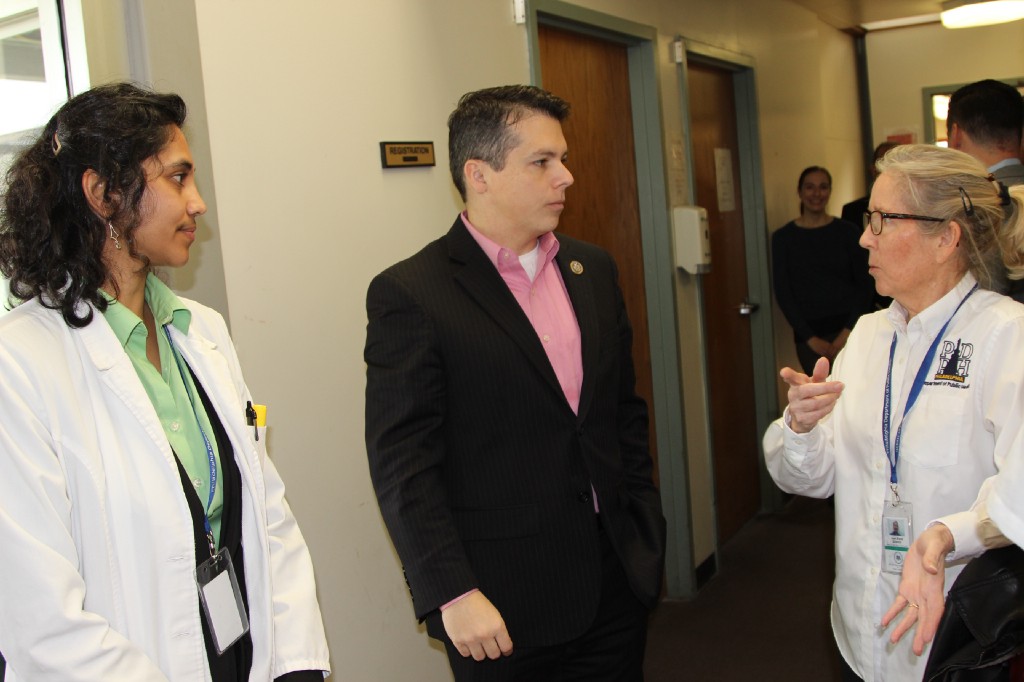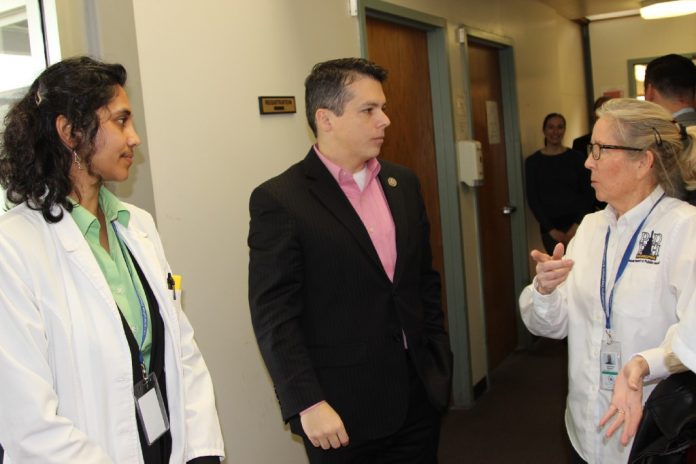U.S. Rep Brandon Boyle said the Trumpcare version adopted on May 4 would place a much greater burden on locally funded health centers that serve lower income populations.

U.S. Rep. Brendan Boyle had been planning to visit a health clinic in his district to underscore the value of a federally funded health and wellness program that was spared temporarily from the chopping block with Congress’ passage of a bipartisan discretionary spending bill last week.
That omnibus bill preserves funding for the National Health Corps and its sister programs — including Peace Corps, AmeriCorps and Senior Corps — through September, although President Trump’s preliminary fiscal 2018 budget still threatens to eliminate the programs.
Yet, during Boyle’s tour of the city’s Health Care Center 10 on Cottman Avenue in Rhawnhurst on Monday, the conversation quickly turned to another raging health-care battle in Washington, D.C., the so-called Trumpcare legislation.
Procedurally and politically, the effort to repeal and replace Obamacare still has a long way to go and several obstacles to navigate before becoming law, said Boyle, who represents portions of Northeast Philadelphia and Montgomery County. But the version adopted by the Republican-led House, on May 4 would cause millions of Americans to lose their health insurance while placing a much greater burden on locally funded health centers that serve lower income populations, according to the legislator.
“The Congressional budget office has said that 24 million Americans would lose their health insurance” under the House’s version of the American Health Care Act of 2017, Boyle said. “It’s not ‘possibly.’”
The package would also result in higher insurance premiums for older people.
“Under Trumpcare, if you are healthy and in your 20s, your rates would probably drop. If you are 50 or older, your rates would probably go up significantly,” Boyle said. “The AARP actually calls it the age tax because you would be paying more for health insurance, and the amount of things that would be covered would drop. So essentially this would be a big loser for seniors. Younger, healthier people, they would probably do better financially.”
In addition, the congressman argued, locally funded health centers such as the one on Cottman Avenue would see an increase in demand. According to the city’s health department, Health Center 10 tallied 62,169 patient visits in fiscal 2016. The city’s eight health centers had 314,129 patient visits combined.
Dr. Deepthi Foxhall, clinical director for Health Center 10, said about half the clinic’s patients are uninsured.
The center “would see a dramatic jump in the number of people who would be treated, the people who really have no alternative,” Boyle said.
Despite extensive media coverage of the May 4 House vote and social media reaction to it, the Trumpcare process is still in its early stages.
“Mitch McConnell (the Republican Senate leader) has signaled that they are going to start from scratch. They will move something on health care, but it will look different than what passed the House,” Boyle said.
In the House, 20 Republicans voted against the bill, as did all 193 Democrats. Republicans hold a slim majority in the Senate with 52 seats, 46 for Democrats and two independents.
“Whether the Senate is able to pass anything at all I think is 50/50,” Boyle said. “If they do, then it would go to a conference committee to hash out the differences (with the House bill). I would say there are four major steps and we’ve just gotten through the first.”
Meanwhile, the lawmaker said he will advocate to preserve programs such as National Health Corps in the fiscal 2018 budget. NHC places young people on health career tracks in public health centers to help patients with various tasks. They help patients understand insurance coverage, fill out prescription assistance forms and learn preventative health practices. NHC volunteers translate for patients who don’t speak English.
The federal government funds the program with $10,500 for each NHC volunteer while the host sites contribute $13,000 each.
At Health Center 10, Columbia University graduate Menaka Dhingra serves in the NES program as a patient advocate. She will start medical school in August. This year, she has helped 179 new patients enroll at the center, 232 patients obtain prescription benefits and 101 patients better understand their health-care programs, said Sara Wein, program director for National Health Corps Philadelphia. Dhingra and other NES volunteers have helped 958 patients obtain $407,000 worth of prescription cost savings, Wein said.
As a component of the federal budget, NHC and its sister programs require a relatively small level of funding, Boyle said.
“The irony is it’s well below 1 percent of the entire federal budget. So for a relatively small amount of money that we spend, it’s one of the best investments we can make,” he said. “They are able to take what they get from the federal government and leverage it into other resources, so I look at it as a wise investment.” ••
William Kenny can be reached at 215–354–3031 or [email protected]. Follow the Times on Twitter @NETimesOfficial.





